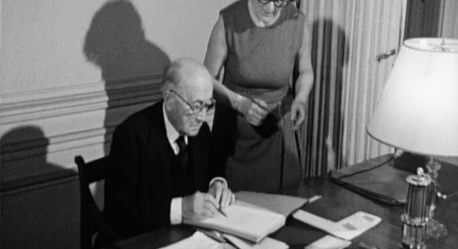
Jean Monnet, the French politician and economic adviser, was a lifelong supporter of European integration, whose ideas inspired the Schuman Plan to unite French and German national production of coal and steel under a single banner.
Life and times
When the First World War broke out in 1914, Monnet contacted the government with a proposal to better coordinate the transportation of war supplies with France’s allies. He was later named Deputy Secretary General of the League of Nations when it was created in 1919. In 1943, Monnet became a member of the French Committee of National Liberation, the de facto French government-in-exile in Algiers. It was at this time that he became explicit about his vision for a united Europe to secure peace.
A vision for Europe
With growing international tensions after the war, Monnet felt that it was time to pursue European unity and he and his team began work on the concept of a European Community. On 9 May 1950, Robert Schuman, France’s Minister of Foreign Affairs, delivered the ‘Schuman Declaration’ on behalf of the French government.
This Declaration was instigated and prepared by Monnet and proposed to place all German-French production of coal and steel under one high authority. The idea behind this was that if the production of these resources were shared by the two most powerful countries in Europe, it would prevent any future war.
Publications
More about Jean Monnet’s life, work and contribution to the European project

